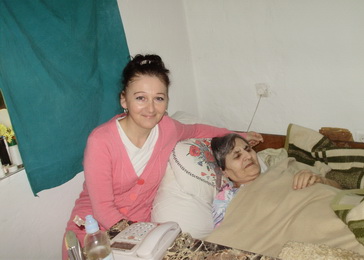 The municipality of Irig and the local Centre for Social Work are the bearers of the project “Improvement of Social Inclusion”, wherein 13 beneficiaries have significantly improved their quality of life, and 10 unemployed persons were engaged.
The municipality of Irig and the local Centre for Social Work are the bearers of the project “Improvement of Social Inclusion”, wherein 13 beneficiaries have significantly improved their quality of life, and 10 unemployed persons were engaged.
The first morning duty at work for Vesna Bjelkić (46), having spent five years on the list of unemployed persons in the National Employment Service, is to say “Good day!” to the grandma Dara Bojčić (82) and her bedbound husband mister Sima. Then she starts the fire in the stove in the somewhat dilapidated, but tidy home of the two elderly Irig residents, who have been bedridden for several years due to age and illness. Then Vesna, educated as an agricultural technician, prepares their breakfast, tidies up the house, and slowly recounts stories from the little town. She is also a resident of Irig – a hilly town in Vojvodina, located on the slopes of Fruška Gora – where the Centre for Social Work, one of the youngest in the Republic (formed in 2011), along with the local self-government, is implementing the project “Improvement of social inclusion of children and adults with disabilities through the introduction of new social services in the municipality of Irig”.
Vesna has been engaged since June 2016, along with seven other colleagues, working as personal assistants to adult persons with disabilities. Assistance for five schoolchildren with development impairments is provided by two personal assistants. (…)
Ivana Nešković is 25 years old, and after acquiring the diploma of preschool teacher and enrolling in specialist studies, she only managed to volunteer for one year in a preschool institution in Novi Sad. She tells us she was a bit afraid of whether she would be able to work as a personal assistant for students with disabilities.
– I was used to working with kids and pre-schoolers, and really, at the beginning, I was a bit scared. However, I became friends with Nemanja really fast. Although the project began near the end of the school year, when he was completing sixth grade, we spent all summer walking, since due to his mobility impairment that is what he missed the most. His parents work, so he spent most of the time in his room or his yard, elaborates Ivana.
With the beginning of the school year, her obligations are to wait for Nemanja fifteen minutes prior to the start of lectures, as he is driven to school by his dad. Then they take a slow walk to school, talk about the previous day, and attend classes. Ivana helps him with turning the pages of his textbooks, with writing. During the big break, she goes to buy him a snack in the nearby bakery, since the school does not have a cafeteria. When the schedule calls for physical education classes, not attended by Nemanja, they sit in an empty classroom, or practice certain lessons with some of the professors. They both simultaneously say that they prefer nice weather, because then they can sit on a bench in the beautiful school yard. (…)
According to Silvana Laćarac, the Director of the Centre for Social Work in Irig and coordinator for personal assistance services, all preliminary activities have been completed prior to starting the project, in order to be well prepared. (…) At the same time, she notes that in addition to the set goals, primarily related to the improvement of social inclusion, this project also improved the quality of life, both for children, as well as adults with disabilities. (…)
For example, by engaging a personal assistant, the parents of thirteen-year old Nemanja gained additional momentum leading them to take him to an orthopaedic doctor, in order to provide him with adequate footwear. One of the daughters of grandma Dara now does not have to leave her household in another village to care for her parents and, as she says, she sleeps better knowing that someone is visiting her mother and father every day.
 Government of the Republic of Serbia
Government of the Republic of Serbia















 pdf [271 KB]
pdf [271 KB]
Leave a Comment